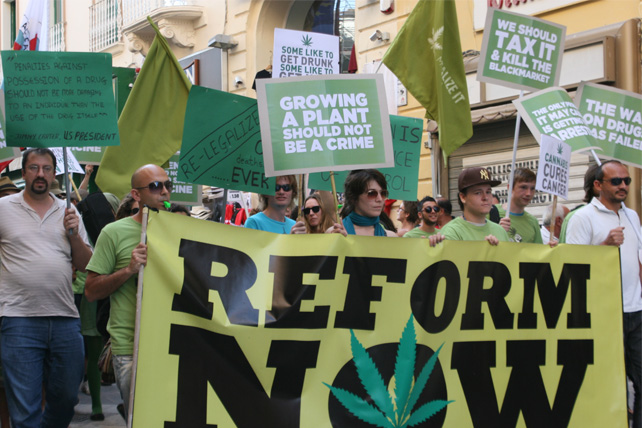Strict and arbitrary punishments for drug offences in Malta have continued to take place – and may have even intensified – since the introduction of legislation that aimed to reduce the criminalisation of drug use.
In April 2015, the Maltese Government passed introduced the Drug Dependence Act, nicknamed the "Treatment Not Imprisonment Act", into law. The Act removed the possibility of criminal prosecution for someone found in possession of “small quantities of prohibited drugs for personal use”, and mandated that they receive a fine instead. The legislation also states that "a person found guilty of cultivating … one [cannabis] plant … shall not be liable to a mandatory term of imprisonment".
While the Act appeared to signify a progressive move in the Mediterranean nation’s drug policy, the consequences of its implementation suggest otherwise.
Prior to the introduction of the Act, people found in possession of a personal quantity of drugs would not necessarily have to pay a fine – rather, they would often face a probation order. While a conviction and a probation order are not conducive to health-oriented drug policy, a fine can lead to a host of new problems for people with problematic drug use, particularly if they are already financially insecure. Financial punishments may exacerbate health and welfare issues of the country's estimated 1,708 "high-risk opioid users”.
In addition, the Act’s change to the Maltese approach to cannabis cultivation poses an inherent problem. Although the legislation removes criminal penalties for the cultivation of one plant, cultivating two or more currently results in a mandatory minimum six-month prison sentence. Franco Debono, the Prime Minister’s consultant on justice reform, warned that this has created an unjust approach based on an arbitrary measurement.
“First of all ‘one plant’ is not a definite amount like ‘one gram’ or ‘one pill’, so practically the law makes no distinction between a two-metre plant and a two-centimetre plant”, Debono told the Maltese Independent last year, “moreover this amendment could give rise to unjust situations. Someone cultivating a two-metre plant would benefit from recent amendment and get a small fine, while someone caught cultivating two two-centimetre plants would be liable to the mandatory minimum six-month jail term. And clearly this could give rise to anomalous situations.”
The Act has also been criticised for not going far enough in reducing other strict mandatory drug sentencing in Maltese law. Magistrate Natasha Galea Sciberr, one of 23 who sit upon the national Bench of Magistrates, described the current approach – by which those who share drugs with their friends are legally treated as dealers – as “draconian”.
Referring to a case of a teenager who shared ecstasy pills with their friends, Magistrate Sciberr said she felt she was “destroying somebody’s life” when she was forced by law to impose a prison sentence. “In the eyes of the law, this does not constitute trafficking by sharing but proper trafficking”, she described, “Despite the person having a clean criminal record, the court has no other option but to send the offenders to jail”.
While there are no immediate plans for changes to Maltese drug law, cannabis reform continues to be prominent topic of political discourse. Prior to his re-election in June 2017, Labour leader Joseph Muscat called for a “national discussion” on the potential legal regulation of cannabis. “We need to look at models adopted by countries such as Canada and Portugal,” he said, “The current system favours criminals and it would be far better to have controls over its distribution … we need to have a mature debate, leading to implementation”. Opposition leader Simon Busuttil has also supported a national discussion on the subject.
There are no apparent plans to implement legislative change to reduce the punitive effects of fines, arbitrary cannabis laws, and mandatory drug sentencing in Malta. However, the cross-party support for the consideration of drug law reform, including among some of the most prominent policymakers, suggests that change may be on the horizon.


